After two years of subdued vigour on April 14, Mumbaikars are gearing up to celebrate Dr B.R Ambedkar’s birth anniversary with greater joy. From family meets and community events to distributing food and books, here’s a glimpse of how families are marking the day
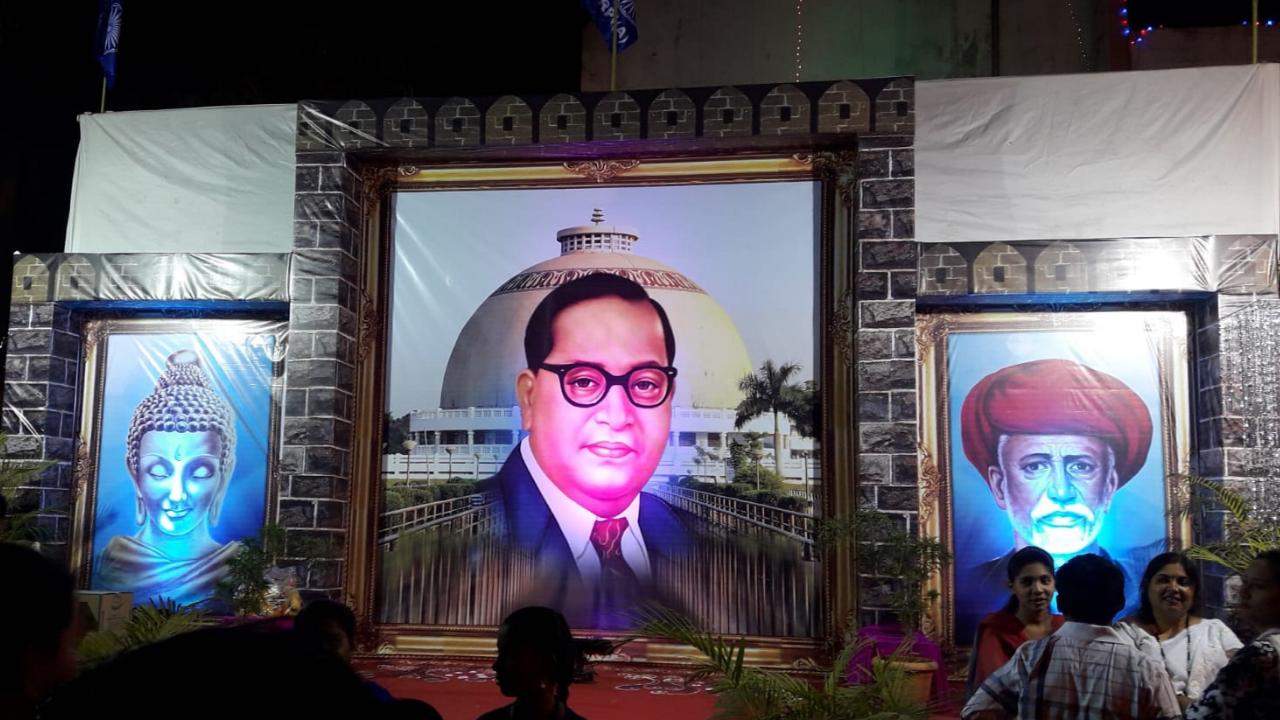
Glimpse of public celebrations on April 14, in the year 2017. Image credit: Abhijit Bansode
The streets of Mumbai have brightened up with shades of blue and white and larger-than-life banners of Dr Bhimrao Ramji Ambedkar meet our eyes in every nook and corner. The city is gearing up to celebrate April 14, the 131st birth anniversary of Dr Ambedkar, also known as ‘Ambedkar Jayanti’ or ‘Bhim Jayanti’.
While the Covid-19 pandemic urged people to have homely celebrations devoid of any community gathering, as restrictions are lifted this year, families who follow Buddhism or all those who follow Dr Ambedkar’s teachings are awaiting joyous celebrations.
“For the past two years, there were no large-scale social celebrations of the Jayanti. However, this year, there are plans to celebrate it in a more enthusiastic manner. There will be prayer meets, social gatherings discussing Dr. Ambedkar’s contribution to various fields,” says Abhijit Bansode, a PhD research scholar at TISS, Mumbai.
Rahul Bhise, a resident of Kalyan, who will be celebrating with his parents after two years, says, “The entire mood on April 14 is different and positive at home. We feel inspired and are excited about celebrating and paying homage to the person who has done so much for us constitutionally, because of whom we can live like humans.”
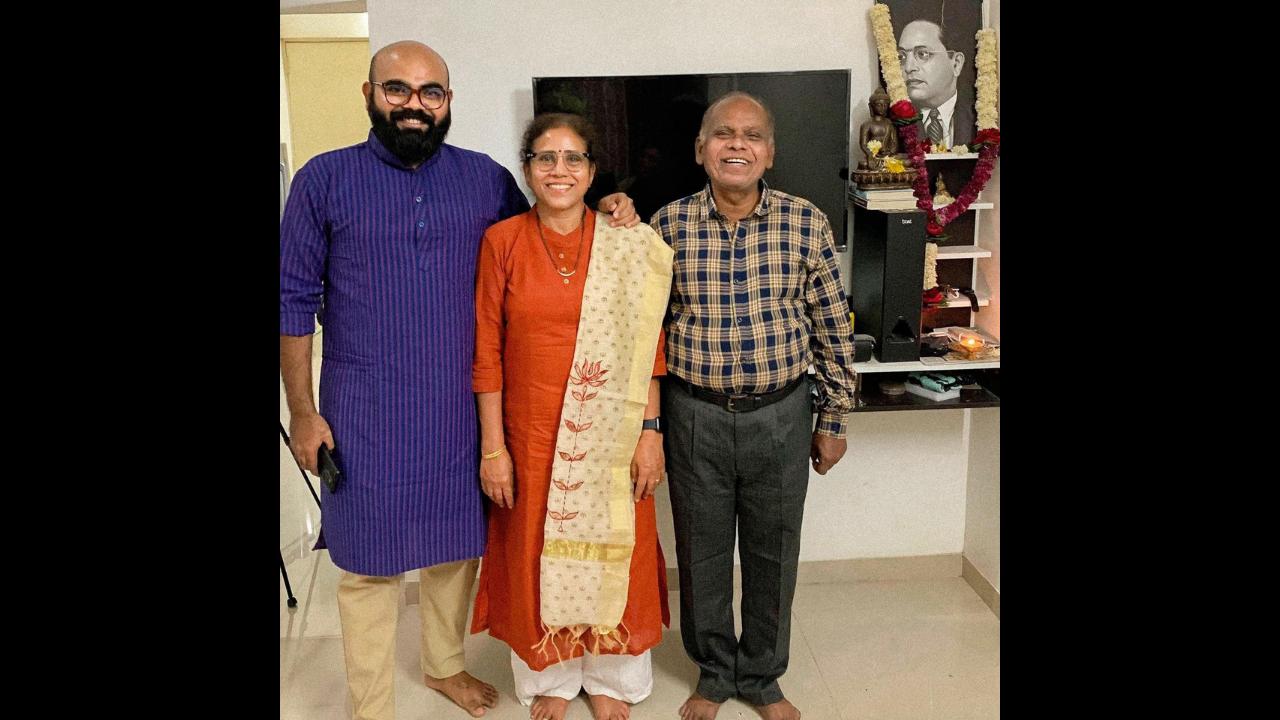 Rahul Bhise with his parents during April 14 celebrations. Image courtesy: Rahul Bhise
Rahul Bhise with his parents during April 14 celebrations. Image courtesy: Rahul Bhise
Dr Ambedkar’s act of rejecting Hinduism and embracing Buddhism in 1956 is considered to be one of the most revolutionary acts in India’s social and cultural history and holds special significance in the lives of around four lakh families who accepted Buddhism along with him.
The humble celebrations at home begin in the morning by waking up earlier than usual, dressing up in white clothes and preparing for oath-taking practices as per Buddhism. This includes the act of offering flowers (not compulsory) and candles to the photo of Dr Ambedkar and the idol of the Buddha and reciting the Trisharan-Panchsheel (Trisharan is taking refuge in Buddha, Dhamma and Sangha and Panchasheel refers to the five oaths undertaken in Buddhism) and Buddha Vandana, two of the significant recitals among others including Bhim Stuti (poetry or a song sung in the remembrance of Dr Ambedkar).
As Bhise and Bansode share, a rare and unique factor about Ambedkar Jayanti celebrations is that families take time to sit together to think and engage in discussions about Dr Ambedkar, the Constitution of India, anti-caste movement and literature and about the path ahead of them.
Bhise’s family, who are not into symbolic celebrations, have a long-time tradition of reading physical books and on April 14 they indulge in donating books, including biographies and titles of social and political importance to public libraries and to people in need. Meanwhile, Shraddha Toraskar from Virar likes to donate food, decorate the house and participate in social gatherings too later in the day.
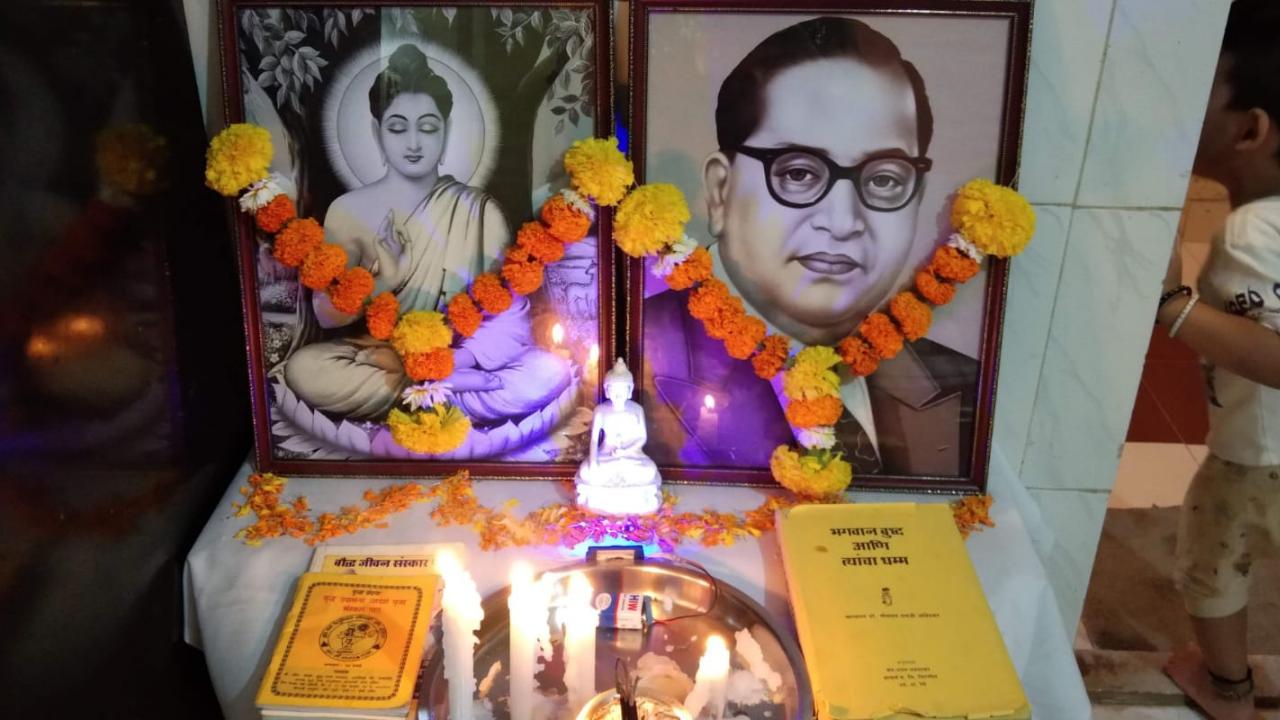 Preparations at Shraddha Toraskar's home. Image credit: Shraddha Toraskar
Preparations at Shraddha Toraskar's home. Image credit: Shraddha Toraskar
Kheer and Puran Poli
After the morning oath taking tradition, family members eat together and some also engage in distributing sweets. While people are free to prepare dishes of their choice based on their resources, Bansode and Toraskar say rice kheer (a sweet dish) is an important part of the festivities. The traditional Maharashtrian staple, puran poli, mainly prepared during celebratory events, is another common dish enjoyed on the occasion. Toraskar says, “We share kheer with our neighbours on the day and also treat people who visit the house with whatever we have prepared at home.”
The importance of kheer is related to the time when Siddhartha Gautam or Buddha was undergoing the process of Asceticism—a lifestyle characterised by severe self-discipline and non-indulgence in worldly pleasures—and consumed food in a rationed manner. A process which lasted for over six years in pursuance of enlightenment, ended with the consumption of kheer provided by Sujata, a resident of Uruvela or Bodh Gaya in Bihar.
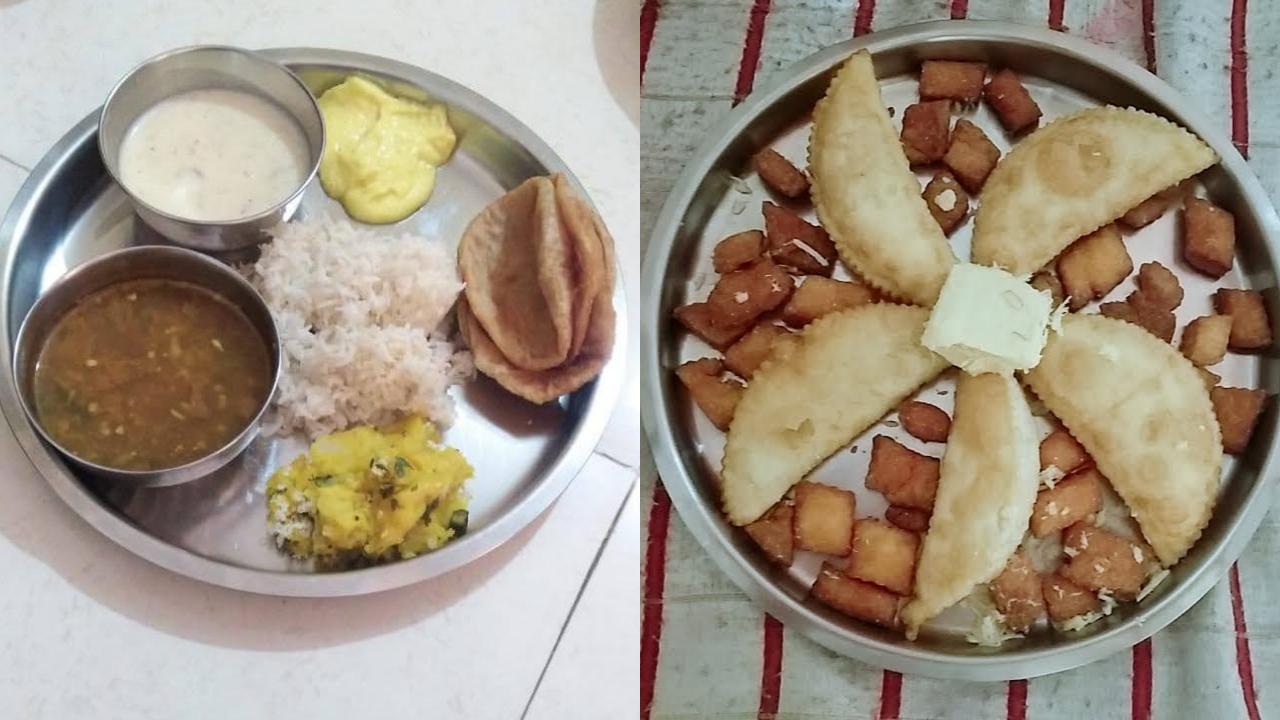 Kheer during lunch (left) and sweets prepared for April 14. Image credit: Shraddha Toraskar
Kheer during lunch (left) and sweets prepared for April 14. Image credit: Shraddha Toraskar
Bansode cites an extract from Dr. B.R. Ambedkar’s ‘The Buddha And His Dhamma’, 1957, where he explains, “New light cannot be attained by him who has lost his strength and is wearied with hunger, thirst and fatigue with his mind no longer self-possessed through fatigue. How could he who is not absolutely calm, reach the end which is to be attained by his mind? True calm and the self-possession of the mind is properly obtained by the constant satisfaction of the body's wants.”
The time when Gautama was undergoing the severest form of Asceticism in Uruvela, Sujata, a local resident, who had conceived a son and had promised yearly offering to the Banyan tree, thought of Gautama as the God of the tree and offered kheer in a golden bowl. Gautama then took the bowl to the river bank, bathed at a place and had the food. “This gave Siddhartha new vigour to attain enlightenment which he did eventually and gave us the Ashtanga Marg (The Noble Eight-Fold Path). Therefore, kheer is a pivotal part of the celebrations in Bauddh families,” says Bansode.
Community get-together
While the day starts with celebrations with family, evenings are meant for visiting local Buddha Viharas or Dadar’s Chaithyabhoomi, Dr Ambedkar’s resting place, and other spaces meant for community gatherings, meet-ups and functions. At some locations, celebrations start from late evening of April 13 and continue for the next 3-4 days.
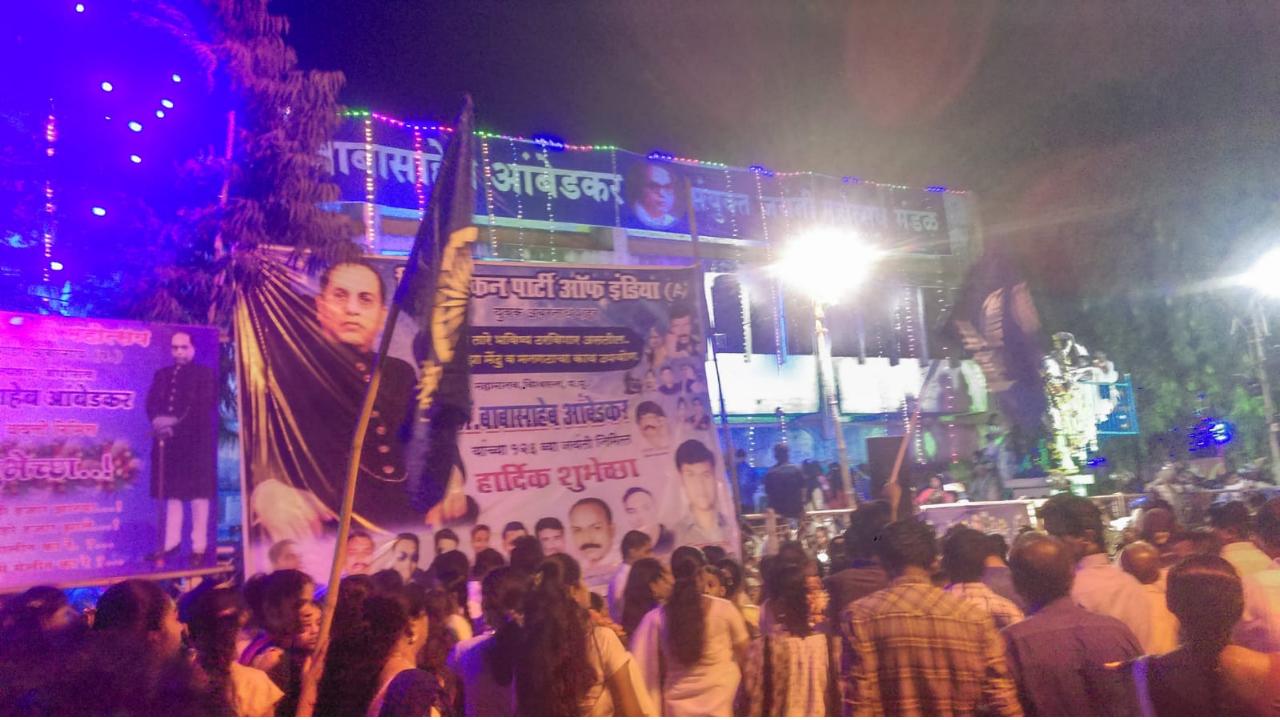 Community celebrations at Bansode's locality in 2017. Image credit: Abhijit Bansode
Community celebrations at Bansode's locality in 2017. Image credit: Abhijit Bansode
For Bansode, accompanying his father to the local municipal ground in the evening of April 13 to watch a play based on socio-political and cultural issues relevant to the day was an annual affair. The plays usually end just half an hour before midnight so that people, including community leaders and local politicians, can gather at the statue of Dr Ambedkar to pay their respects. The play resumes after these activities and midnight rallies and processions from different parts of the town gather at the municipal area. After a break of two years, Bansode says the town is gearing up for similar celebrations.
In addition to processions, Toraskar says people wear colourful clothes in the evening and attend gatherings for participating in Bhim Geet (songs on Dr Ambedkar), Buddha Geet (songs on Buddha), Shahiri Jalsa (Ambedkarite poetry and anti-caste performances), dance and art competitions and speeches or lectures conducted by intellectuals. These art events and lectures extensively discuss the contribution of Dr Ambedkar in the anti-caste movement and his fight against untouchability.
“Topics such as his contribution to nation-building, women empowerment, reforms in different sectors of the economy and society, in drafting the Constitution of the Republic of India are also discussed in these public meetings,” says Bansode.
Raja Tayade, coordinator Bahujan Vikas Sangh (BVS) in Mulund—a forum to come together and discuss ideas, perspectives, experiences and debate, shares that for the organisation and for many families, April 14 is about very intimate and disciplined celebrations, who do not believe in processions and symbolic power display. Bhise agrees, adding that though community processions do have a social and political significance, at an individual level it is a disciplined affair.
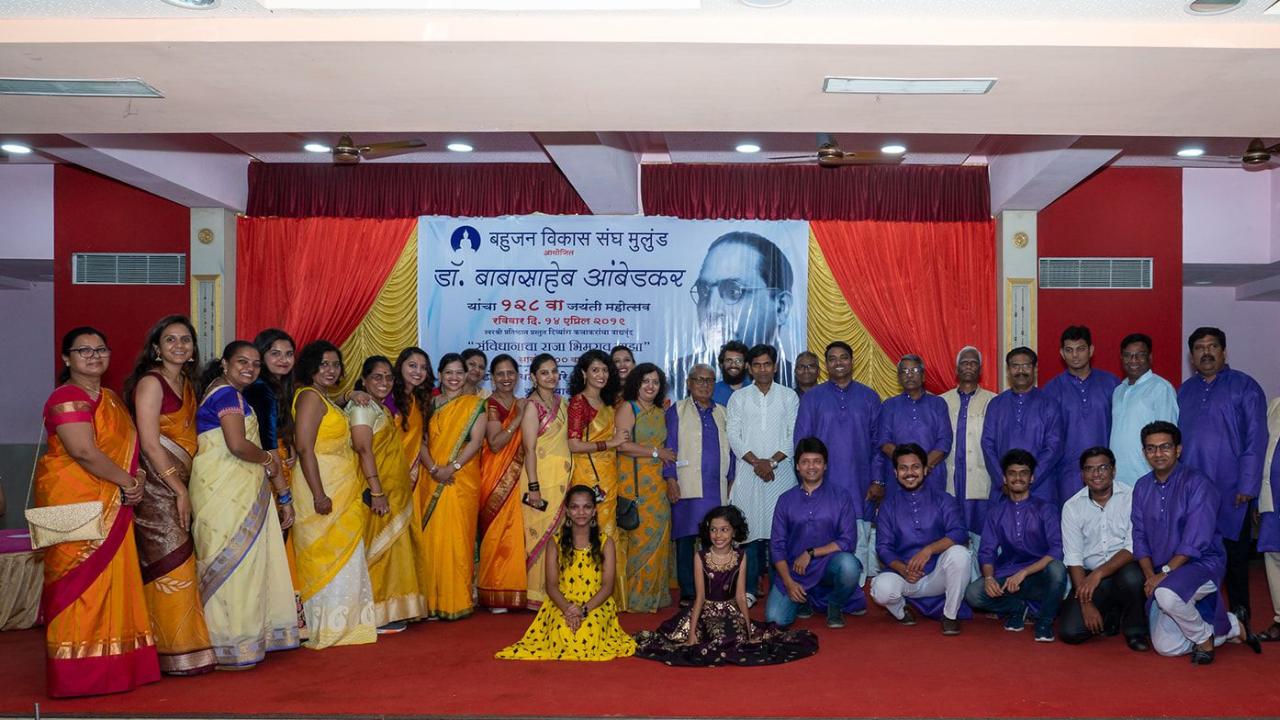
Members of the Bahujan Vikas Sangh during the Jayanti celebrations in 2019. Image courtesy: Raja Tayade
This year, all members, young and seniors, of the BVS are engaged in planning and executing the festivities with equal opportunity. While junior members will be performing skits and songs on the values of Dr Ambedkar, senior members will prepare speeches on inculcating these values in daily values.
“Coming out triumphed, this year's celebration is definitely going to be a special one to recognise the efforts put down by the brave community members (healthcare, pharma workers) during Covid-19, and remembering the members we lost,” says Tayade.
Following Dr Ambedkar’s message of ‘Educate, Agitate, Organise’, the organisation will also felicitate community members who have graduated, post graduated, PhD fellows, young entrepreneurs with new achievements, who have helped in the community’s growth.
“Our aim is to build an ecosystem for all our members to meet, connect, discuss, and follow teachings of Babasaheb and improve the quality of life for each one of us,” adds Tayade.
‘We are because he was’
The birth anniversary of Dr Ambedkar, which falls in the month of ‘Dalit History Month’, holds special significance in the lives of families who have embraced Buddhism and all those who follow his teachings and social and political path. In conversation with families in Mumbai, one realises that the knowledge of historical importance of the day is not lost upon the celebrators and that the connection with the leader is not merely political, but a little personal, like a family member.
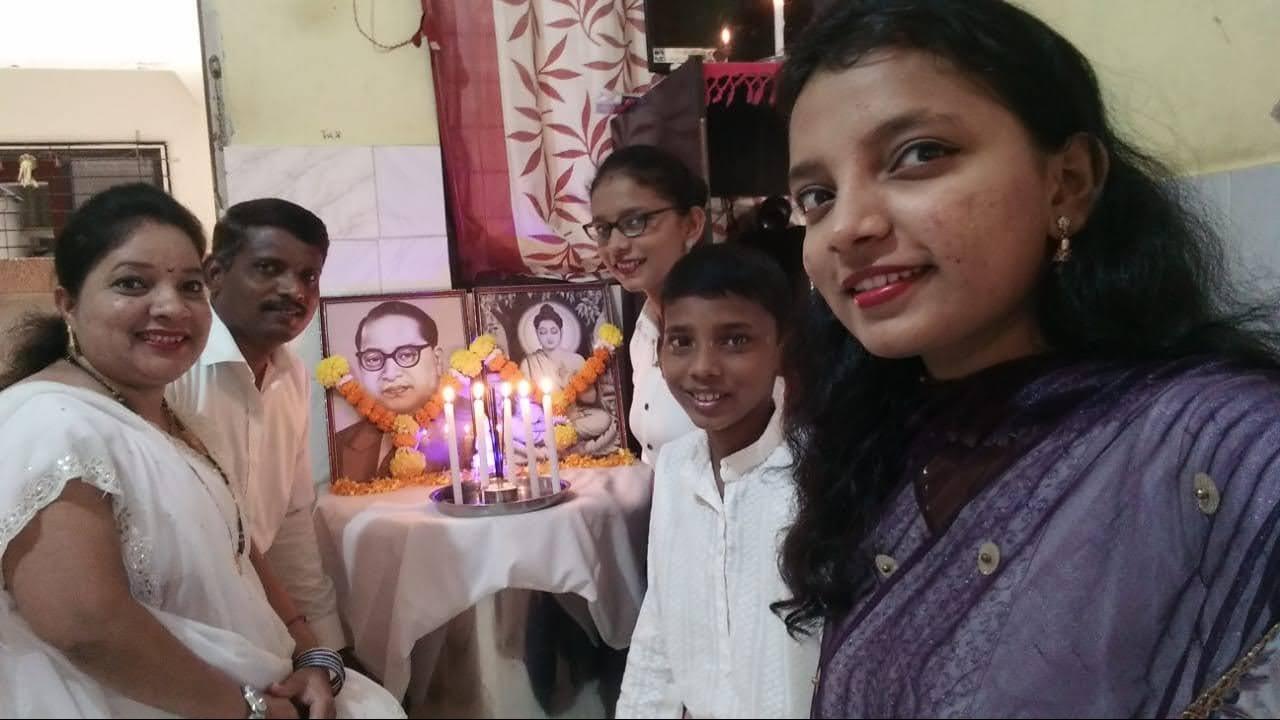
Shraddha Toraskar with her family. Image courtesy: Shraddha Toraskar
“We are because he was,” says Toraskar, while Rahul says, “It’s like our father’s birthday” as they talk about the kind of intimacy they share with ‘Babasaheb’ and sum up the relevance of the day in the lives of the community. At an individual and at a community level, it’s more than just an annual celebration, and is about an opportunity to remember and discuss history and the contributions of Dr Ambedkar’s struggles to establish a just and equal society.
From access to food, water in public spaces, shelter to the opportunities of education, employment and a dignified life for the marginalised communities in a caste-ridden society; the community owes it all him. Through community celebrations, the teachings are passed on to the younger generation, who can then take it forward. As the sources explain, his contributions to the society as a scholar, parliamentarian, social reformer and a journalist — the greatest being the drafting the Indian Constitution — have focused on social, economic and political justice to the masses, and not just one community.
“It is often discussed, iterated and re-iterated in the family discussions that the house we live in today, the fan above our head, the food we eat, the clothes we wear – everything is possible because of the endless struggle Babasaheb did,” says Bansode.
“This day is like a festival for us and it brings us immense joy, satisfaction and peace. It is with eagerness that we await the dawn of this day every year. For us, Babasaheb Ambedkar is the greatest human and we celebrate his Jayanti with much joy and eagerness,” he concludes.
Also read: Dr Ambedkar Book Centre: Six years after demolition, the legacy continues at a makeshift stall in Dadar
 Subscribe today by clicking the link and stay updated with the latest news!" Click here!
Subscribe today by clicking the link and stay updated with the latest news!" Click here!








